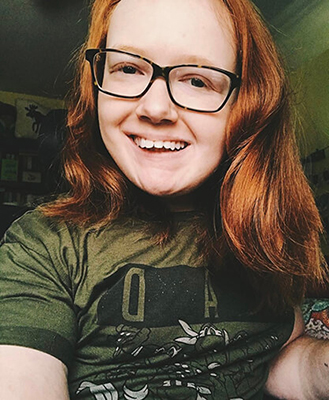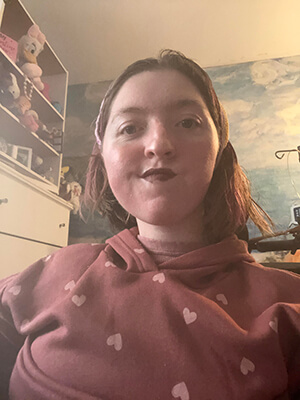Coping as a Young Adult With SMA
Taking on your own care
As a child, were your parents your primary caregivers? Or did you have a personal care assistant (PCA) who provided much of the support you needed to manage daily activities? Who are your caregivers now?
- Kellie: When I was younger, I had nurses, but they were not really helpful. They always looked for problems and blamed my parents. Both my parents worked during this time, but eventually, everything got so bad with the nurses that my mom had to quit and stay home full-time to help me. Because of all that, my mom has been my main caregiver for my teens and all of my 20s. When I was a teen, I definitely didn't appreciate our relationship, but now we’re stronger than ever and best friends. I'm so thankful for that, and I'm feeling understood and relaxed.
- Jennifer: Growing up my parents were always my primary caregivers. My mom stayed home from work to care for me and my three other siblings without disabilities. My dad worked to provide for our family and helped when he was home with care. My siblings would also often pitch in when I was a kid with grabbing me things I needed, opening things, etc., when my mom or dad were busy. As of right now, my mom is still doing my full-time care routine 24/7. My dad still helps as needed, but it’s often my mom doing the most due to me being a female and wanting that level of privacy. Although, I know my dad would do whatever I needed in a heartbeat if he had to.
As a young adult, do you feel you are in control of handling the day-to-day aspects of your SMA, including scheduling doctors’ appointments, coordinating transportation, and managing getting showered, dressed, etc.? What are some of the challenges around those responsibilities?
- Kellie: Definitely scheduling, but otherwise no. Mom and I talk, but sometimes, as we all know, SMA changes your plans. What are some of the challenges around those responsibilities? Day to day, these things are fine, but sometimes SMA can mess with the mundane. It's hard to explain unless you have it.
- Jennifer: I absolutely feel in control of my day-to-day care and handle all aspects of my life. As I’ve gotten older, I’ve learned to voice what I want and need. While I do suffer from social anxiety, it does become challenging to take over the scheduling of doctors appointments. But I am learning to manage that anxiety and get things done when they need to be done. My mom, who is my caregiver, also will help with scheduling things I need when I ask her to do so.
Has taking on your own care changed your relationships with your parents?
How has your relationship with your caregivers/parents changed as you’ve transitioned from childhood to adulthood?
- Kellie: Absolutely! Unfortunately, my relationship with my parents wasn't the best as a teen. It wasn't their fault. It was a perfect storm of hormones and an SMA hell storm. After high school, I found an SMA doctor, Dr. Bach. This has allowed things to finally settle down and for my parents and I to have a tighter relationships because we always have each other and...it just feels better now we have each other and nurses are not judging our every move.
- Jennifer: For me personally, things haven’t changed too much. My mom has always been my caregiver, and in a way, it’s what’s worked best for me all this time. We have our own connection and language when it comes to what I do or don’t need, and that I think that would be really hard to replicate with someone else. It’s hard to find someone who completely understands your diagnosis and what your body is able to do. The only thing we struggled with was having her let go a little and let me decide what was best for me when I needed it. For example, letting me decide when I want to begin my self-care routine or shower routine.
Mental health concerns
What impact has the added responsibilities as a now-adult living with SMA had on your mental health?
- Kellie: Excellent and very important question! Now that I'm an adult, I definitely feel more in charge of my SMA, and this has helped me with my mental health. I now finally have a chance to breathe and think about what I actually want out of life.
- Jennifer: It’s really a balancing act. I’ve had to learn to keep all of my medical needs at the forefront, whereas previously, my mom worried about that. Now, I have to learn to manage work, family, medical issues, and a social life. Which is all very stressful. I’ve recently begun going to therapy to learn to cope with my disability and life in general.
What coping strategies have you put into place to help ease this transition in your life?
- Kellie: Coping strategies? Hmm...I really struggled in the beginning, and nothing helped, even therapy. I would say to keep in touch with or find someone in the community. It really saved me.
- Jennifer: I’ve learned to take it as it comes, honestly. Deal with one issue or situation at a time.
The future
What advice would you give someone going through this transition right now?
- Kellie: Strap in; it's gonna be a bumpy ride. Not going to lie, it's going to be super tough. I know that's not advice, but it's a truth we need.
Jennifer: It’s okay to be overwhelmed by the idea of going into adulthood with SMA, but I promise it’s not that scary. Talk with your family, parents, care team about what you want your life to look like as you grow up, and come up with a plan on how to achieve those goals step by step, big or small.
How optimistic are you for an independent adult life going forward?
- Kellie:I definitely feel better now that I found an SMA doctor and that I have a better team. I feel at peace finally, and that's all I've wanted for years.
- Jennifer: I’m very optimistic for an independent adult life. I think independent adult living can come in many forms and ways. For me, it’s managing my life how I want while living at home with my parents. There’s no one right way to be an adult living with SMA.


Join the conversation